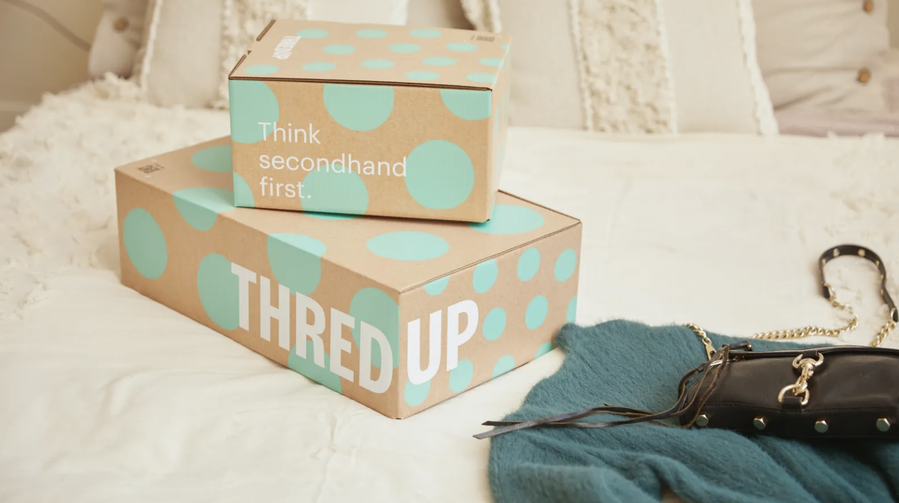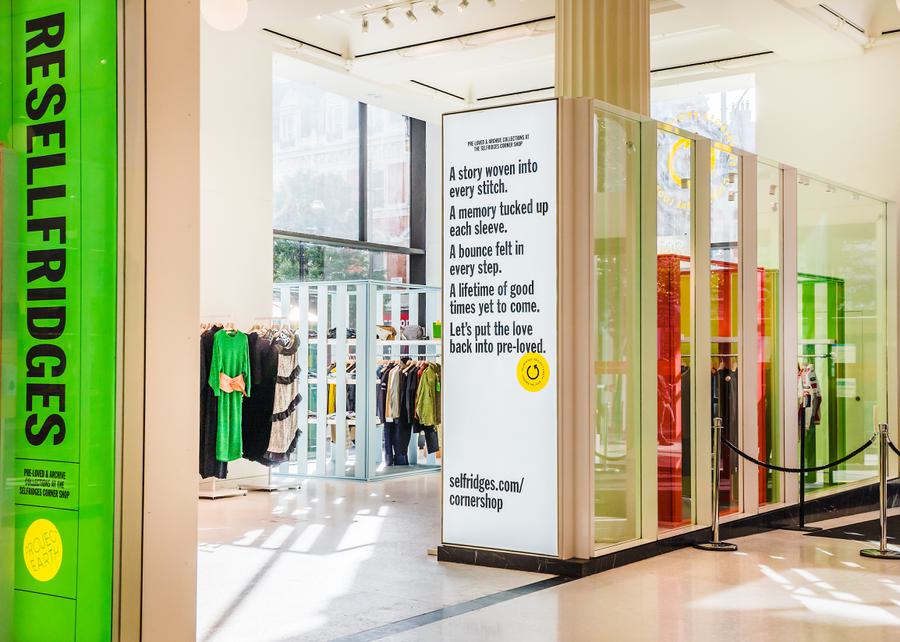Conscious Consumption
The latest edition of The Briefing, where we highlight key trends and share more on the ideas and insights that are driving innovation today.

The latest edition of The Briefing, where we highlight key trends and share more on the ideas and insights that are driving innovation today.

This briefing looks at how consumers and, accordingly brands, are becoming more considered in their choices and actions and how purpose and ethics can help differentiate in a crowded market.
Trend Summary:
Both established and start-up brands are responding to increasing consumer demand for accountability, transparency and action specifically concerning limiting the effects of climate change.
Takeaways:
1. Personal Innovation Favorite: Outfit styling app Whering allows consumers to organise and curate their wardrobes to get a better understanding of their wearing habits and make the most out of their existing clothes and any future purchases.
2. Consumers are actively seeking more sustainable retail solutions. Tools and initiatives that make ‘doing good’ easy and barrier-free will see consumers returning again and again to the brands that adopt them.
3. Strong, ethical commitments and, importantly, visible action create genuine and lasting connections with like-minded consumers, building a loyal community.
The new year is often a catalyst for personal change - a time to review and reflect, the setting of goals, and a promise to be/do ‘better’. With the almost daily bombardment of worrying statistics around climate change, it is little wonder that this year these resolutions have appeared more outwardly focused and sustainability-minded.
The ‘rule of five’ has trended heavily on social media. Started by fashion consultant and retailer Tiffanie Darke in 2023, and based on research by the Hot or Cool Institute think tank, the movement advocates for buying no more than five new items of fashion a year - the tangible figure required for keeping temperature rises below the 1.5-degree target (importantly, second hand or rental items do not count toward that total).
Secondly, in a continuation of a trend started in lockdown when ideas of repair and mending tapped into the global psyche, hashtags #visiblemending and #mendingmatters have become ever more prominent.
In response to, and in tandem with, this trend, several start-up brands are seizing on gaps in the market to help consumers fulfill their sustainability goals and established brands are pivoting to ensure their vision and ethos remain future-proof and relevant to new, sustainability-focused, consumer demands.
For brands to navigate these new demands, the key ingredient is authenticity and an onus on real change. We look at some of the brands leading the push to help us all to do better.

ThredUP removes pain points from re-selling and second-hand purchasing
As rental and resale businesses take an ever-increasing share of all corners of the global fashion market - from budget to luxury - ThredUP looks to simplify the process for both sellers and buyers as a third-party conduit. Managing pricing, fulfillment, payments, and customer service for a cut of the profits, ThredUp takes away the possible stress and time-consuming nature of re-selling, whilst offering buyers the chance to shop sustainability without the endless searching and potential risk, packaged up - quite literally - in a nice box!

Vestaire doubles down on commiting to squeeze out fast fashion
The resale giant Vestaire Collective, launched a global campaign using AI called ‘Think First, Buy Second’ across all digital channels to coincide with 2023’s Black Friday. The campaign showed computer-generated images of clothes piled up in iconic global locations (such as the Eiffel Tower) to replicate the size and scale of textile waste and landfills that many countries offload to others to facilitate their fast fashion habit. A bold statement from a brand that essentially creates profit from customers buying fashion items, but one that looks to reaffirm the brand’s commitment as a home of sustainable, ethical fashion, asking social media users to pledge their allegiance to turn Black Friday into ‘Better Friday’ by committing to only buy second-hand.

Selfridges explores a circular model to ensure enduring relevance
January saw a permanent location confirmed for fashion repair firm Sojo within Selfridges. The B-Corp-certified company offers tailoring, alterations and repairs starting from £5. This is the latest addition to Selfridges’ ‘Resellfridges’ destination - a hub that brings together rental, resale & repair - which is at the heart of their bold target of 45% of transactions coming from circular products and services by 2030. This in turn builds from their 2020 ‘Planet Earth’ sustainability strategy which sees the company promise ‘to explore and redefine our business model with sustainability and circularity as our North Star’. Their ambitious strategy includes targets related to material use, packaging, circular models, and changing mindsets.

Patagonia is “in business to save our home planet”
Often cited as at the pinnacle of sustainable fashion brands, and one of the earliest to receive b-Corp status, Patagonia took a step (or, more accurately, a giant leap) further in 2022 when the family-run business transferred 98% of the company’s stock (worth about $100m a year in dividends) to a not-for-profit organisation; the Holdfast Collective. This collective is tasked with using “every dollar received to fight the environmental crisis, protect nature and biodiversity, and support thriving communities, as quickly as possible”. The bold move is designed to set an example that brands can survive, and thrive when the key mission is not the figure on the bottom line. As founder Yvon Chouinard said “The average lifespan of a corporation currently is a little over 20 years, but we’re still here after five decades of doing things on our own terms”, proving that a strong ethic and vision can create a steady and loyal customer base.

Whering app allows users to get the most from their existing wardrobes
Ever dreamt of having your own version of Cher’s iconic virtual wardrobe (to those under 25 - see the cult classic film Clueless from 1995 and thank me later)? Well, now you can thanks to the innovative Whering app from self-confessed recovering fast fashion addict CEO Bianca Rangecroft. The app allows users to easily catalogue their wardrobe by uploading photos of items and then curating outfits and lookbooks around them. It professes to shift consumers away from throwaway culture and reinvent looks from what they already have in their wardrobes, monetising the offer by also identifying additional eco-friendly purchases (high quality, long-lasting, investment pieces) through sustainability-focused brands such as Mother of Pearl and Ganni that would optimise wardrobe potential. As, according to Wrap (Waste and Resources Action Programme), we only wear 20-30% of our wardrobes, the benefits of reframing and rejuvenating what we already own are obvious. Additional features hone in on the environmental impact of individual wardrobes, showing statistics on CO2 emissions and the number of times pieces are worn, in a hope of changing mindsets long-term.

Toast’s events calendar cements its position as an ethical brand giving back
Long seen as a brand for those wanting slow fashion with an emphasis on ethical production, their events series, begun in 2018, looks to bring together like-minded people to share knowledge and ideas. From workshops linked to fashion longevity (such as garment repair and darning), to online talks on micro-growing and edible planting, their events programme focuses on sustainable living. Further to this, their circular initiatives programme looks to keep ‘well-crafted pieces in circulation’ through their free mending service (TOAST Repair), collection of creatively repaired pieces (TOAST Renewed), events-based clothes swap (TOAST Exchange) and, most recently, their collection of previously loved pieces (TOAST Reworn). Their approach feels authentic and reassuring in a retail landscape that often feels anything but.
1. A defined and authentic purpose has never been more important.
2. This purpose must be supported by commitments and visible action to create a genuine connection with consumers.
3. Brands that make ‘doing good’ easy and barrier-free will see consumers returning again and again.
4. Educational offers and services that empower the consumer, and align with a brand's purpose, can foster a deeper connection and build community and lasting loyalty.
See more of our regular 'Briefings' here - https://bit.ly/3rylWGs
Let us know below what you think and get in touch if you want a further breakdown of any specific trend at hello@dalziel-pow.com

The first ever SXSW London took over Shoreditch this month, offering a wealth of inspiration and insights across tech, business and culture. We share our thinking into how it can return even bigger and better for 2026.

